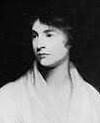

The Shelleys left Britain in 1818 for Italy, where their second and third children died before Mary Shelley gave birth to her last and only surviving child, Percy Florence. In 1816, the couple famously spent a summer with Lord Byron, John William Polidori, and Claire Clairmont near Geneva, Switzerland, where Mary conceived the idea for her novel Frankenstein. They married in late 1816 after the suicide of Percy Shelley's first wife, Harriet. Over the next two years, she and Percy faced ostracism, constant debt, and the death of their prematurely born daughter. Together with Mary's stepsister, Claire Clairmont, they left for France and travelled through Europe upon their return to England, Mary was pregnant with Percy's child.

In 1814, Mary Godwin began a romantic relationship with one of her father’s political followers, the married Percy Bysshe Shelley. Godwin provided his daughter with a rich, if informal, education, encouraging her to adhere to his liberal political theories. When Mary was four, Godwin married his neighbour, Mary Jane Clairmont. Mary Godwin's mother died when she was eleven days old afterwards, she and her older half-sister, Fanny Imlay, were raised by her father. Her father was the political philosopher William Godwin, and her mother was the philosopher and feminist Mary Wollstonecraft. She also edited and promoted the works of her husband, the Romantic poet and philosopher Percy Bysshe Shelley. Mary Shelley (née Mary Wollstonecraft Godwin 30 August 1797 – 1 February 1851) was a British novelist, short story writer, dramatist, essayist, biographer, and travel writer, best known for her Gothic novel Frankenstein: or, The Modern Prometheus (1818).


 0 kommentar(er)
0 kommentar(er)
